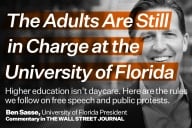You have /5 articles left.
Sign up for a free account or log in.
Some months ago I started asking friends, colleagues from my teaching days, researchers in higher education, faculty members of various ages and ranks, deans, provosts and presidents, and focus groups of students: “What’s the status of the Big Questions on your campus?” Quite deliberately I avoided defining “Big Questions,” but I gave as examples such questions as “Who am I? Where do I come from? What am I going to do with my life? What are my values? Is there such a thing as evil? What does it mean to be human? How can I understand suffering and death? What obligations do I have to other people? What does it mean to be a citizen in a democracy? What makes work, or a life, meaningful and satisfying?” In other words, I wanted to know what was happening to questions of meaning and value that traditionally have been close to the heart of a liberal education.
Some of what I found puzzled me. People pointed out quite properly that some Big Questions were alive and well in academia today. These included some questions about the origin of the universe, the emergence of life, the nature of consciousness, and others that have been raised by the scientific breakthroughs of the past few decades.
In the humanities and related social sciences the situation was rather different. Some friends reminded me that, not all big questions were in eclipse. Over the past generation faculty members have paid great attention to questions of racial, ethnicity, gender and sexual identity. Curricular structures, professional patterns, etc. continue to be transformed by this set of questions. Professors, as well as students, care about these questions, and as a result, write, teach and learn with passion about them.
But there was wide agreement that other big questions, the ones about meaning, value, moral and civic responsibility, were in eclipse. To be sure, some individual faculty members addressed them, and when they did, students responded powerfully. In fact, in a recent Teagle-sponsored meeting on a related topic, participants kept using words such as “hungry,” “thirsty,” and “parched” to describe students’ eagerness to find ways in the curriculum, or outside it, to address these questions. But the old curricular structures that put these questions front and center have over the years often faded or been dismantled, including core curricula, great books programs, surveys “from Plato to NATO,” and general education requirements of various sorts. Only rarely have new structures emerged to replace them.
I am puzzled why. To be sure, these Big Questions are hot potatoes. Sensitivities are high. And faculty members always have the excuse that they have other more pressing things to do. Over two years ago, in an article entitled “Aim Low,” Stanley Fish attacked some of the gurus of higher education (notably, Ernest Boyer) and their insistence that college education should “go beyond the developing of intellectual and technical skills and … mastery of a scholarly domain. It should include the competence to act in the world and the judgment to do so wisely” ( Chronicle of Higher Education, May 16 2003). Fish hasn’t been the only one to point out that calls to “fashion” moral and civic-minded citizens, or to “go beyond” academic competency assume that students now routinely achieve such mastery of intellectual and scholarly skills. We all know that’s far from the case.
Minimalist approaches -- ones that limit teaching to what another friend calls “sectoral knowledge -- are alluring. But if you are committed to a liberal education, it’s hard just to aim low and leave it at that. The fact that American university students need to develop basic competencies provides an excuse, not a reason, for avoiding the Big Questions. Students also need to be challenged, provoked, and helped to explore the issues they will inevitable face as citizens and as individuals. Why have we been so reluctant to develop the structures, in the curriculum or beyond it, that provide students with the intellectual tools they need to grapple thoughtfully over the course of a lifetime with these questions?
I see four possible reasons:
1. Faculty members are scared away by the straw man Stanley Fish and others have set up. Despite accusations of liberal bias and “brainwashing” no faculty member I know wants to “mold,” “fashion” or “proselytize” students. But that’s not what exploring the Big Questions is all about. Along with all the paraphernalia college students bring with them these days are Big Questions, often poorly formulated and approached with no clue that anyone in the history of humankind has ever had anything useful to say about any of them. There’s no need to answer those questions for students, or to try to fashion them into noble people or virtuous citizens for the republic. There is, however, every reason to help students develop the vocabularies, the metaphors, the exempla, the historical perspective, the patterns of analysis and argument that let them over time answer them for themselves.
2. A second possible reason is that faculty are put off by the feeling they are not “experts” in these matters. In a culture that quite properly values professional expertise, forays beyond one’s field of competence are understandably suspect. But one does not have to be a moral philosopher to raise the Big Questions and show some of the ways smart people in the past have struggled with them. I won’t pontificate about other fields, but in my own field -- classics and ancient history -- the Big Questions come bubbling up between the floor boards of any text I have ever taught. I don’t have to be a specialist in philosophy or political science to see that Thucydides has something to say about power and morality, or the Odyssey about being a father and a husband. A classicist’s job, as I see it, is to challenge students to think about what’s implicit in a text, help them make it explicit and use that understanding to think with.
3. Or is it that engaging with these “Big Questions” or anything resembling them is the third rail of a professional career. Senior colleagues don’t encourage it; professional journals don’t publish it; deans don’t reward it and a half dozen disgruntled students might sink your tenure case with their teaching evaluations. You learn early on in an academic career not to touch the third rail. If this is right, do we need to rewire the whole reward system of academia?
4. Or, is a former student of mine, now teaching at a fine women’s college, correct when she says that on her campus “It tends to be that … those who talk about morality and the big questions come from such an entrenched far right position … that the rest of us … run for cover.”
Some of the above? All of the above? None of the above? You tell me, but let’s not shrug our shoulders and walk away from the topic until we’ve dealt with one more issue: What happens if, for whatever reason, faculty members run for the hills when the Big Questions, including the ones about morality and civic responsibility, arise? Is this not to lose focus on what matters most in an education intended to last for a lifetime? In running away, do we not then leave the field to ideologues and others we cannot trust, and create a vacuum that may be filled by proselytizers, propagandists, or the unspoken but powerful manipulations of consumer culture? Does this not sever one of the roots that has over the centuries kept liberal education alive and flourishing? But, most serious of all, will we at each Commencement say farewell to another class of students knowing that for all they have learned, they are ill equipped to lead an examined life? And if we do, can we claim to be surprised and without responsibility if a few decades later these same graduates abuse the positions of power and trust in our corporate and civic life to which they have ascended?








